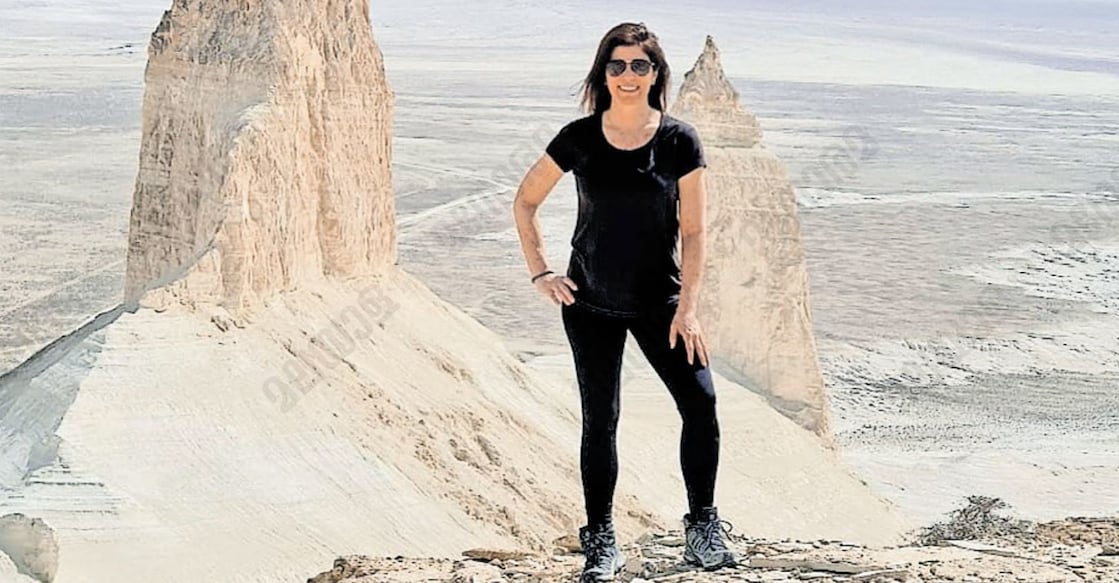Meet Gina Morello, the solo traveller who visited every country in the world

Mail This Article
The stunning mountainous region known as the Wakhan Valley, located along the border of Tajikistan, can only be accessed after a five-day horseback journey from Kabul, the capital of Afghanistan. To reach the Matsés people, native to the Amazon Rainforest, one must embark on a two-day boat trip. In the Bijago tribe of Guinea-Bissau in West Africa, women assume the role of family leaders. Sealand, an offshore platform off the coast of England, is the smallest country in the world. North Korea presents significant challenges for entry. The Yamal Peninsula, located in northern Siberia, Russia, experiences extreme temperatures that can plummet to minus 50 degrees Celsius. These are just a few unconventional destinations explored by Gina Morello, an American woman who has travelled to every country in the world, each offering rare and diverse experiences.
Born in the U.S. and currently residing in Portugal, Gina Morello has travelled to all 193 United Nations Member Countries. 90 per cent of her travels are solo. Before the COVID pandemic, she was employed as an aviation consultant, but she has since transitioned to freelance work. It took her 20 years to visit all the countries and she is now planning to explore unique and adventurous destinations.
Gina speaks with Manorama about her travels:
Q: Is there a place you wish you were born in?
A: The place I love the most is where I am staying right now, Lisbon, the capital city of Portugal. I am very fond of the culture and the people of this city. Lisbon gets an average of 300 days of sunshine per year. Additionally, the public transport system is exceptional. The city is designed in such a manner that one can easily navigate it on foot. And now I have stopped using my car. The extensive beaches and the mysterious forests of Sintra are ideal for exploration during leisure time. Throughout my travels to 193 countries, I frequently reflected on the values that have been instilled in me over the years. I felt that my birthplace, the United States of America, did not align with my evolved beliefs and values. Portugal and other European countries resonated with the way of life and values I believe in. Therefore, when I am in Lisbon, I truly feel at home.
Q: What country would you consider the most women-friendly?
A: Iceland, the place I have visited four times is the most women-friendly country. The country has very strict laws to protect the rights of women, a commitment that is evident in its cultural norms that honour and respect women. Norway, which I have had the pleasure of visiting five times, boasts significant gender equality and a low crime rate, allowing me to feel safe walking anywhere at any hour. Finland is also a country with similar traits. Finland also welcomes individuals from all walks of life.
Q: What is one scene that has been etched in your memory during your travels?
A: The helicopter journey I experienced over Mount Everest is an unforgettable memory that will remain with me as long as I am alive. I couldn't hold my tears looking at the world's highest peak. The sheer magnitude of Everest is beyond description, particularly when viewed from the proximity of a helicopter hovering near the mountain.
Q: When did you decide to visit all the 193 countries in the world?
A: In 2012, I randomly calculated the number of countries I visited and that was the turning point. I had visited 90 countries by then. Therefore I aimed to complete visiting 100 countries. I achieved that milestone the same year and decided to visit all the countries in the world.

Q: What was the first and last country you visited?
A: The first foreign country I visited was Mexico. The 193rd country I travelled to was Mozambique in Africa. When I landed there, I was overwhelmed with joy and tears. That was a very special moment in my life.
Q: How was the experience travelling to North Korea and Iran?
A: North Korea stands out as one of the most intriguing countries to visit. Travelling to a nation governed by a dictatorship is very different compared to other countries. It was an opportunity to understand the lives of the people residing in a totalitarian regime. I visited North Korea in 2016 before the imposition of travel restrictions for Americans. Our mobile phones, laptops, cameras, and bags will all be thoroughly searched before entering the country, primarily focussing on items deemed inappropriate by North Korea. As I had around 20,000 photographs stored on my mobile phone, it was quite time-consuming to get it back. Fortunately, I had removed all the photos and movies from my laptop. The journey within North Korea is very peculiar. I would describe it as surreal. It feels like a dream but it's as real as you and me.
Though Iran has restrictions, the warmth and friendliness of its people are remarkable. In my experience, Iranians are among the most hospitable individuals I have encountered. They graciously invite visitors for tea, share meals, and often offer accommodation to travellers exploring their country.
Q: How much did you spend to visit all the 193 countries?
A: I had the opportunity to travel to many countries for my work in the early stages of my career. Aside from those travels, I have spent close to 5 lakh dollars (appx. Rs 4.1 crore).
Q: What advice would you offer to women who enjoy travelling alone?
A: If you have decided to embark on a solo journey, then do not wait for a partner or a friend. If you rely on others for travel plans, that may result in missed opportunities. If you are travelling solo for the first time, it is advisable to select a nearby destination where language barriers are minimal and thereby reduce your stress. Always conduct thorough research on the destination you are planning to visit. Pay attention to what you shouldn't do and areas to avoid. Always inform one trusted person about your travel itinerary. Refrain from sharing personal details on social media platforms. Always ensure that your mobile phone is fully charged. Familiarize yourself with some basic phrases in the local language for daily use while travelling. Prioritize on finding a safe accommodation and if you are opting for a dormitory, make sure it is exclusively for women. Most unfortunate incidents tend to occur during late-night or early-morning hours, so it is wise to avoid travelling during these times.

Q: Where all did you travel in India?
A: I visited Mumbai, Goa, New Delhi, Agra, Kolkata, and Chennai during my previous visit to India. Currently, I have returned to India to experience the Hornbill Festival in Nagaland, where I will stay for three weeks. India is one of the two countries that have profoundly influenced my passion for travel, the other being Vietnam. The cultural experiences I encountered in India was so different from those I had previously observed. It was a cultural shock for me. But I really enjoyed it.
Q: Which are the five countries you like and five countries you don't like?
A: That's a very difficult question. Each country is attractive in different ways. When considering natural beauty, I would pick Antarctica and Norway. Additionally, I like countries such as Ethiopia, India, Afghanistan, and Yemen, which maintain rich ancient cultures and traditions. I prefer not to mention the names of countries that are less favourable. The nations that are less welcoming to tourists and are known for high levels of corruption are those I don't like, particularly in Central Africa.
Q: Which of the 193 nations has your favourite cuisine?
A: I love Thai cuisine, particularly its distinctive masala blends and exceptional flavors. I also like Italian, Lebanese, Ethiopian, Indian, and Vietnamese dishes. I embarked on an intriguing project titled 'A Taste of 193,' which aimed to prepare one recipe from each of the 193 countries in my own kitchen and document the experience. I couldn't continue with due to my travel commitments. I have added a few recipes on my website, www.adventurousgina.com
Q: Which country and its citizens do you consider to be the most peaceful?
A: I have felt Iceland as a place of tranquillity, reflecting the peaceful nature of its people, nature, and community. This perspective is deeply personal. This is also a country with no military presence. The people here prioritize sustainable environmental practices and social equality. The beauty of Iceland, characterized by its hot springs, waterfalls, and snow, is truly beyond description.
Q: Can you tell us about some of the strange experiences during your journeys?
A: I have had an experience of drinking reindeer blood with the Nenets tribe, situated in the Yamal Peninsula of northwest Siberia, Russia. This practice is part of their culture. The Nenets are indigenous people who inhabit the Arctic region and are known for their nomadic lifestyle as reindeer herders. They endure extreme temperatures that can go to minus 50 degrees Celsius, living in harmony with their natural surroundings. They drink the blood of reindeer to help them acclimatize to the harsh climate and provide a rich source of vitamins. They also eat raw meat of the reindeer. Although this experience was unusual for me, it was very normal for them.

